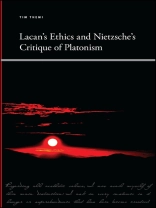Brings Lacan and Nietzsche together as part of a common effort to rethink the tradition of Western ethics.
Bringing together Jacques Lacan and Friedrich Nietzsche, Tim Themi focuses on their conceptions of ethics and on their accounts of the history of ethical thinking in the Western tradition. Nietzsche blames Plato for setting in motion a degenerative process that turned ethics away from nature, the body, and its senses, and thus eventually against our capacities for reason, science, and a creative, flourishing life. Dismissing Plato’s Supreme Good as a 'mirage, ’ Lacan is very much in sympathy with Nietzsche’s reading. Following this premise, Themi shows how Lacan’s ethics might build on Nietzsche’s work, thus contributing to our understanding of Nietzsche, and also how Nietzsche’s critique can strengthen our understanding of Lacan.
Spis treści
Acknowledgments
Abbreviations
Introduction
1. The Deflationary Ontology of Lacan and Nietzche
1.1 Lacan’s Tripartite Schema with Nietzche’s Critique of Plato’s Good
1.2 Lacan’s Freudian Thing in the Critique of Aristotle’s Good
2. Distinguishing Weak Sublimation From the Strong
2.1 The Promise of Sublimation and Its Discontents
2.2 Lacan’s Treatment of Sublimation
2.3 Nietzche’s Distinction between Weak and Strong
3. Before the Good: Strong Ethics in Sophocles’ Antigone
3.1 Creon against Antigone: In the Name of the Good
3.2 Antigone against Creon: Lacan, the Beautiful, a Second Death
3.3 Before the Good: Nietzche’s Strong Dionysian Catharsis
4. Birth of the Good: Weak Ethics in Socrates’ Alcibiades
4.1 Lacan’s Analysis of Symposium Speeches Prior to Socrates
4.2 The Speech of Socrates: Denaturalizing with Diotima
4.3 Enter Alcibiades: Renaturalizing with Object Agalma
5. God of the Good: Christocentric Oedipal Morality
5.1 The Deaths of God in Lacan’s Seminar VII
5.2 Recapitulating a Decade Later in Seminar XVII
5.3 The Nietzschean Appraisal from The Anti-Christ
6. Service of Goods: Nature and Desire in Modern Science
6.1 Lacan’s Critique of Science in Seminar XVII
6.2 Nietzche’s Empiricist-centered Positive Comments on Science
6.3 Lacan’s Mathematics-centered Positive Comments on Science
Conclusion
Notes
Bibliography
Index
O autorze
Tim Themi has a Ph D in philosophy and teaches at Deakin University in Australia.












